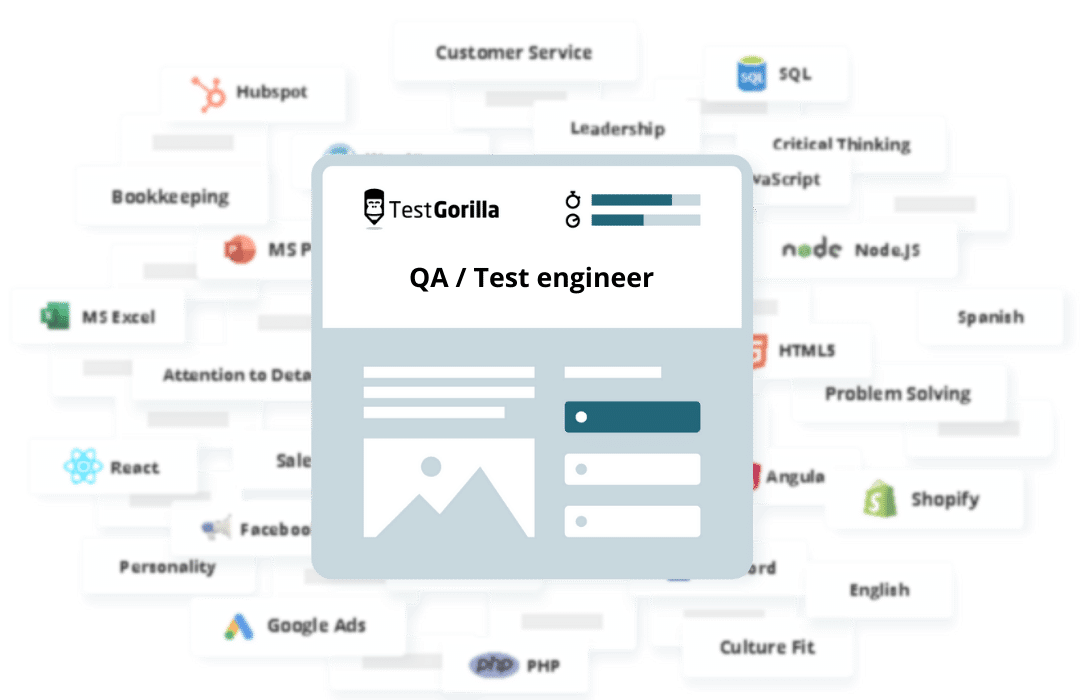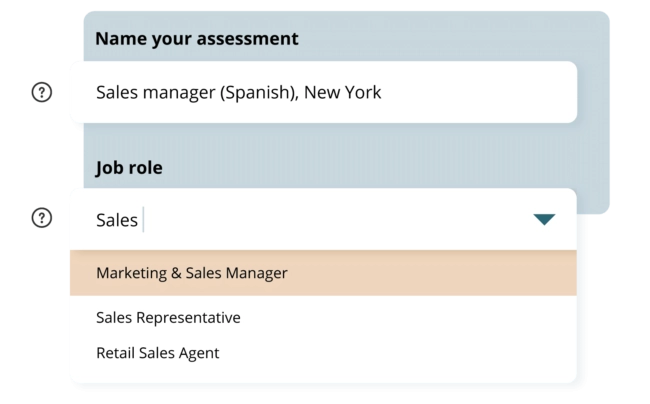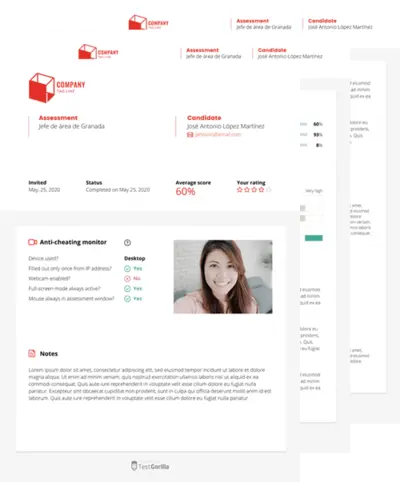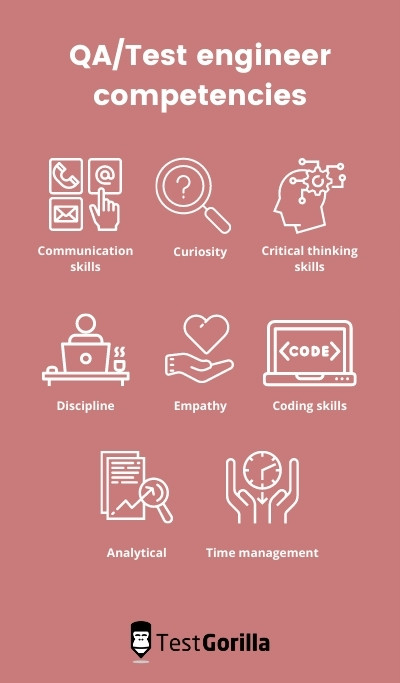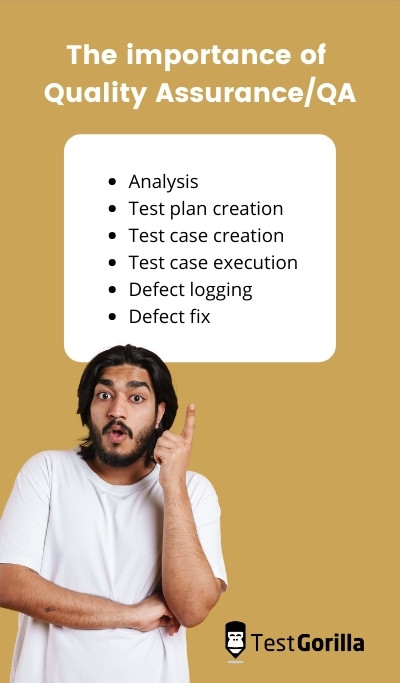QA skills test: Pre-employment screening assessment to hire the best candidates
Summary of the QA / Test engineer test
The QA / Test engineer test evaluates candidates on the key skills required to be an effective software test engineer. It helps you identify candidates who can apply their knowledge effectively in a team setting and manage projects to achieve results.
Covered skills
Effectively applying general test knowledge
Communicating effectively in a team setting
Applying project management capabilities
Understanding test execution methods and tools
Use the QA / Test engineer test to hire
Software Test Engineers
Type
Time
Languages
Level
About the QA / Test engineer test
Test engineers ensure the quality of the products that your team puts in in the hands of customers. It is one of the important roles in software development and plays a crucial role in the success of your company. Software test engineers identify and fix technical issues across various aspects of a product, such as functionality, durability, safety, and speed, to ensure that the quality of the final product matches the quality guidelines and expectations set by the company.
The QA / Test engineer test assesses candidates’ abilities to apply general test knowledge and to communicate effectively in a team setting. It also assesses their project management capabilities and their knowledge of test execution methods and tools
Candidates who score well on this test not only have the theoretical knowledge needed for software testing but can also apply that knowledge skillfully and effectively. They can communicate well with their teams and other stakeholders and manage projects well to ensure that both quality requirements and deadlines are met.
The test is made by a subject-matter expert
Erman G.
Earning a bachelor’s degree in business IT & management was the catalyst for Erman’s avid interest in QA. In 2014, he stepped into his first role as a software tester—and never looked back.
Over the next five years, Erman was recognized for his creative and results-driven approach to software testing. His adeptness as a QA engineer opened doors to positions in top companies throughout the Netherlands. Recently, Erman decided to extend his reach in the field by branching out as a freelancer.
Crafted with expert knowledge
TestGorilla’s tests are created by subject matter experts. We assess potential subject-matter experts based on their knowledge, ability, and reputation. Before being published, each test is peer-reviewed by another expert, then calibrated using hundreds of test takers with relevant experience in the subject. Our feedback mechanisms and unique algorithms allow our subject-matter experts to constantly improve their tests.
What our customers are saying
TestGorilla helps me to assess engineers rapidly. Creating assessments for different positions is easy due to pre-existing templates. You can create an assessment in less than 2 minutes. The interface is intuitive and it’s easy to visualize results per assessment.
David Felipe C.
VP of Engineering, Mid-Market (51-1000 emp.)

Any tool can have functions—bells and whistles. Not every tool comes armed with staff passionate about making the user experience positive.
The TestGorilla team only offers useful insights to user challenges, they engage in conversation.
For instance, I recently asked a question about a Python test I intended to implement. Instead of receiving “oh, that test would work perfectly for your solution,” or, “at this time we’re thinking about implementing a solution that may or may not…” I received a direct and straightforward answer with additional thoughts to help shape the solution.
I hope that TestGorilla realizes the value proposition in their work is not only the platform but the type of support that’s provided.
For a bit of context—I am a diversity recruiter trying to create a platform that removes bias from the hiring process and encourages the discovery of new and unseen talent.
David B.
Chief Talent Connector, Small-Business (50 or fewer emp.)

Use TestGorilla to hire the best faster, easier and bias-free
Our screening tests identify the best candidates and make your hiring decisions faster, easier, and bias-free.
Watch what TestGorilla can do for you
Create high-quality assessments, fast
Building assessments is a breeze with TestGorilla. Get started with these simple steps.
View a sample report
The QA / Test engineer test will be included in a PDF report along with the other tests from your assessment. You can easily download and share this report with colleagues and candidates.
Why a test for QA/Test engineer is important
The test for a QA (Quality Assurance)/Test engineer can help you evaluate the skills necessary for a QA/Test engineer to succeed in your company. If you need to recruit a skilled software test engineer, giving candidates a pre-employment test will assess their skills in an objective and bias-free way.
In businesses, test engineers may have the following job responsibilities:
• Test the quality of products that you launch to your customers• Suggest solutions that will fix identified problems• Research and investigate product quality to make improvements• Supervise and manage the entire quality planning strategy• Work closely with the product development team to make sure that product changes are implemented according to the highest standards• Identify possible problems, challenges, and bottlenecks when it comes to product quality and suggest solutions
This is a role that plays a vital part in your company’s success. QA/Test engineers identify and fix multiple issues concerning your product. Elements of the software such as functionality, durability, safety, and performance speed are all things that the test engineer will have to manage. They are there to ensure that the product delivers the highest quality in relation to any guidelines or expectations that have been set.
TestGorilla's QA/Test engineer test will assess the applicant's ability to find problems, their general knowledge about testing, their ability to communicate effectively with their team and cross-teams, and their understanding of different QA and testing tools.
QA/Test engineer competencies for candidates
There may be specific competencies required for a person who will take on the QA/Test engineer role in your organization. The main competencies are:
• Communication skills: The QA engineer will have to communicate with multiple stakeholders about quality assurance. They will lead the process, work with the product development team, and keep their managers informed, so they need to have great communication skills.
• Curiosity: The job of a QA engineer is more than just testing out bugs. They probe and look at the user experience and interface design, and go deep into the software to find all the things that could create questions, challenges, and problems for the customer.
• Critical thinking skills: The QA engineer will have to figure out multiple scenarios to test the software to get it ready to launch to the public, so they need to apply critical thinking in almost every step of their job.
• Discipline: Not only will they have to discipline themselves to go over the testing details, but they will also need to lead others by example. They are in charge of the entire quality assurance process and work with multiple teams to ensure that every stage is as productive as possible.Attention to detail: The QA engineer will need to be as precise as possible when testing the software. They will need to find even the smallest problems and bugs in the software and make sure not to miss anything (because the customer will find it).
• Empathy: The QA/Test engineer will have to put themselves into the customer’s shoes to figure out what they will have a problem with. This requires empathy from the QA engineer. It’s also beneficial to have empathy when dealing with peers and colleagues, since this will create better working relationships.
• Coding skills: Even though QA engineers don’t need to have coding skills, it can be beneficial. This way, they can communicate with software engineers and the product development team using “their language.” Not only that, but they will understand any problems better and will know what is (realistically) possible when it comes to the software they’re testing.
• Time management: QA engineers need to spend as little time as possible testing the software so it can get out to the public as soon as possible. This means they need to do all the necessary tests on a tight deadline, which is why QA engineers need impeccable time-management skills.
• Analytical skills: The QA engineer needs to spot both strengths and weaknesses of the software product: the strengths, so that the product development team can emphasize them more, and the weaknesses, to fix them quickly.
The importance of Quality Assurance (QA)
Quality assurance can be divided into six main categories:
• Analysis• Test plan creation• Test case creation• Test case execution• Defect logging• Defect fix
And there are four main QA engineering roles:
• Test analyst: This role requires the QA engineer to define, develop, and apply tests to analyze the software. They check software for completeness and consistency.• Test designer: Here, the QA engineer must create tests and plan an approach to ensure that the tests will be successful.• Test executor: In this role, the QA engineer runs the software through testing. This is where the executor will see if the product runs without bugs and problems, and if new problems will occur during the testing phase.• Test manager: Here, the QA engineer must manage the entire process, from developing and designing the test to running it and communicating with all stakeholders about deadlines and processes.
How can a QA/Test engineer test help recruiters hire?
With a QA/Test engineer test, you can assess your candidates’ abilities in a bias-free, objective, and quantifiable (numerical) way.
You should give all your candidates a pre-employment QA/Test engineer test, because it gives every applicant a chance to prove their skills. And this solution is scalable, as well as saving you time: whether there are 50 or 250 applicants, your hiring manager can distribute the test with a single click.
In summary
When hiring a QA/Test engineer, make sure you give your candidates a pre-employment test that will verify their skills. Not only will this save you time and money, but the results you get are also objective, bias-free, and quantifiable, enabling you to identify the top talent at the start of your recruitment process before making the best hire
FAQs
Related tests
AI Product Manager
Computer Networking Fundamentals
LinkedIn Advertising
Design Thinking
International Trade Law
Data Storytelling
Shift Coordination
Training and Development
Pharmacist
HIPAA

